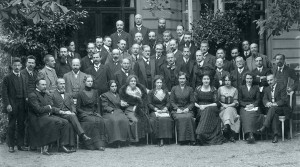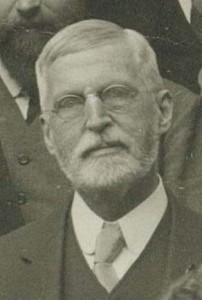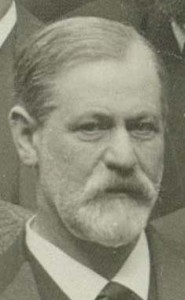by Andreas Peglau
*
In 1983 Helmut Dahmer reported in the journal Psyche on publications that took a stand on the identity of psychoanalysis in the late 1920s, early 1930s. Key points were, on the one hand, Wilhelm Reich’s pleas for a rapprochement of psychoanalysis and Marxism, on the other hand, the emphasis on the scientific-objective, therefore „non-political“ character of analysis as well as the distancing from „leftist“ psychoanalysis interpretation and Bolshevism.
Dahmer also pointed out that something comparable had already occurred „on the eve of World War I,“ „in the form of a discussion of the relationship between psychoanalysis and ‚philosophy'“ (Dahmer 1983, p. 1133). This earlier controversy is also worthy of consideration.From September 20-22, 1911, 55 of the then 106 members of the International Psychoanalytical Association (IPA) gathered at the Weimar Hotel „Erbprinz“ for their third congress.
Among them were most of the important analysts of the first generation: Abraham, Brill, Eitingon, Federn, Ferenczi, Freud, Hitschmann, Jones, Jung, Pfister, Putnam, Rank, Sachs, Stekel. Eugen Bleuler and Ludwig Binswanger also traveled, and Lou Andreas-Salomé was present for the first time.
On the morning of September 21, the lectures began. And the very first speaker, James Jackson Putnam, 64-year-old Harvard professor, neurologist of international standing and president of the newly founded U.S. Analytic Association, was to kick off the aforementioned controversy. Because his visit, which signaled the breakthrough of analysis in the United States, was considered the „high point of the convention“ (Jones 1984, p. 109), he was offered the opening address.
To this Putnam gave the title, „On the Significance of Philosophy for the Further Development of Psychoanalysis.“ He took the opportunity to offer not only positive appreciation but also criticism of Freudian teaching, which had been troubling him for some time (Hale 1971, pp. 117-119).
From his multifaceted text, published in 1912 as a 16-page article in the psychoanalytic journal Imago, I will mention below only those theses that are directly related to my topic.
Putnam stated that man is „first and foremost a spiritual being“. This, however, cannot be fathomed sufficiently with the „biogenetic“ method usual for psychoanalysis, according to which – analogous to biology – from simpler earlier later more complex forms develop. The look back, into childhood, is insufficient. Only the content of what the human mind deals with grows with the years of life and becomes more complex – that, but also only that, is investigated by the biogenetic method. The mind was also not a „mere function of the brain,“ as most scientists calling themselves natural scientists claimed, but existed a priori, preceded „physical development,“ and therefore could not be a „final result of other forces primarily occurring in physical development“ (Putnam 2012a, pp. 104-5-106).
It was not Putnam’s merely private views that he presented: the line of thinkers he invoked was headed by Georg Friedrich Wilhelm Hegel and Henri Bergson. Some of what he said, moreover, brings to mind today’s discussion of the compatibility of psychoanalysis and neurobiology. But whatever one thinks about Putnam’s theses: In any case, he touched on an important point here, namely the „scientistic self misunderstanding“ of psychoanalysis as an alleged natural science (Dahmer 2012).
To approach the mind as a „self-acting force,“ Putnam continued, „ordinary psychological training“ was not enough. Psychoanalysts, who after all wanted to become „no longer mere therapists, but connoisseurs of the soul in the noblest and broadest sense,“ would rather also need that knowledge that philosophers had been accumulating for a long time (ibid., p. 107). But for this
„we must decide to pronounce in favor of this or that worldview. Our previous position in this respect has been a negative one. We have not subscribed to any such view, but neither have we wanted to show any particular rejection of any. In fact, however, the psychoanalytic writings generally bear witness on the part of their authors to views that are by no means without tendency“ (ibid., p. 108).
The „lack of willingness on the part of many natural scientists as well as some psychoanalysts to subscribe to any general worldview“ is based, according to Putnam, on a „resistance, in the psychoanalytic sense“: One does not like to pay attention to a „disturbing“ – I think it was meant: rival – „line of evidence“ (ibid., p. 112).
How did analysts evaluate Putnam’s challenge?
In his biography of Freud, Ernest Jones states that all twelve papers presented at the Weimar Congress were „of a high standard“ (Jones 1984, p. 109). With this, however, Jones probably expressed neither his own nor Freud’s honest opinion. The latter expressed himself quite condescendingly about several congress lectures anyway (Peglau/Schröter 2013, pp. 140-146), but he did so most disparagingly in relation to Putnam. Regarding Putnam’s paper, the outlines of which had been communicated to him in advance, Freud wrote to Jung that it „is worth nothing, but […] will do well as an ornament“ (Freud/Jung 1974, p. 488). According to Jones, Freud later added, „Putnam’s philosophy strikes me as a very decorative table centerpiece; everyone admires it, but no one touches it.“ And of the Weimar meeting, Jones reports, Putnam’s „strongest concern, the introduction of philosophy into psychoanalysis […] did not meet with much approval. Most of us did not see the need to adopt any particular system“ (Jones 1984, pp. 109-110).
To Putnam himself, who was important because of his reputation and position in U.S. psychoanalysis,Freud sent far more positive but patently untrue feedback: The lecture had had a „significant effect“ on him, and the Imago article that grew out of the lecture had „received much applause.“ However, Ferenczi would take this article as the occasion for a rebuttal, „in which our modest point of view is to be represented“ (Hale 1971, pp. 364-366). The formulation „our point of view“ indicates that Ferenczi’s replication, approved by Freud anyway (Freud/Ferenczi 1993 p. 102), essentially corresponded to Freud’s then current attitude as well.
In this reply, which also appeared in Imago, Ferenczi gave several reasons why psychoanalysis should not „subordinate itself to or be subordinated to“ any philosophical view.
First of all, psychoanalysis still had the task of „collecting facts without presuppositions“. Beyond that, it is „obliged to examine every kind of mental performance, philosophies not excepted, for its conditions of origin and to give the laws that otherwise prevail in the psychic validity in them as well.“ Thus psychoanalysis is „lawgiver of philosophizing“, must be „judge also over philosophy“. Philosophies, moreover, are, „like religions: Works of art, poetry, which certainly contain a lot of grandiose inklings […]. But they belong to another category than science“. For of the latter there is „only one, but philosophies and religions there are as many as there are people gifted with different schools of thought and minds“.
And finally, the binding of analysis to a particular worldview was also impossible because „the facts of psychoanalysis can be incorporated into any materialistic or spiritualistic, monistic or dualistic system“ (Ferenczi 1912, pp. 520-522).
Theodor Reik also published a much shorter replication, not going beyond Ferenczi, in the Zentralblatt für Psychoanalyse (Reik 1913). Putnam wrote rejoinders to Ferenczi and Reik (Putnam 1912b; 1913) in which he varied his Weimar remarks. But this was not the end of the discussion. In 1914, in Zur Geschichte der psychoanalytischen Bewegung, Freud felt it necessary to publicly reject Putnam’s „unfulfillable demand“ that psychoanalysis „should find itself in the service of a certain moral-philosophical worldview“ after all (Freud 1914, p. 71). As so often, Freud thus went into contradiction with himself without making this known. In 1910, only one year before the Weimar Congress, he had asked Alfred Adler to present at the next psychoanalytic congress
„discuss the question […] whether P(sycho) A(nalysis) is compatible with every worldview, or whether it does not rather urge toward a very definite liberal one, reformatory in education, state, and religion, which necessarily calls upon the adherents of P(sycho) A(nalysis) to join a certain party in practical life“ (quoted in Falzeder 2010, pp. 1120f.).
Since Adler adhered to socialist ideas and had good contacts to the Austrian Social Democracy (Reichmayr 1994, p. 23), it is also clear that the worldview Freud was flirting with at this time was a socialist one – as it was held by many early Viennese analysts anyway. Now, at and after the Weimar Congress, this was officially rejected.
The position now represented instead by Freud, Ferenczi, Reik, probably also Jones, can be summarized as follows: On the one hand, there is psychoanalysis, (natural) science, objective facts, tendencyless research, in short: the truth – on the other hand, subjective, quasi-religious speculations of mind-controlled philosophers, which can best be approached by psychoanalyzing them.
This, of course, was also a possible justification for ignoring approaches to thought that – like that of Marx and Engels – explored some aspects of human life far more profoundly than Freud. However, it seems to me particularly unrealistic to reduce Marxism – despite all its limitations – to „grandiose inklings“. This label fits much better to some psychoanalytic writing, including large parts of Totem and Tabu (cf. Lohmann/Pfeiffer 2006, p. 169f.), about the content of which Freud first publicly hinted in Weimar in 1911.
Nevertheless, Freud seems to have maintained this view. In a letter to Siegfried Bernfeld of May 22, 1932, he summarized his „basic attitude toward Marxism“ thus:
„a) Theoretical Marxism is a theory of things with which PsA [psychoanalysis] has not yet dealt; it cannot therefore replace it at present.
b) There is no obstacle that can make it impossible for PsA to make progress into the field now encompassed by Marx[ism]. […]
c) For theoretical Marx[ism], such a capacity for development[un]g and expansion does not exist“ (Freud 2012, p. 220).
Thus, Marxism could never replace psychoanalysis – vice versa, indeed.
A second point in Ferenczi’s, probably also in Freud’s attitude of 1911/12, is unpleasant: the pride about the allegedly arbitrary fit between psychoanalysis and any worldview.
At this time Arthur de Gobineau had long since published his essay On the inequality of the races of men, Houston Stewart Chamberlain The foundations of the nineteenth century, Helena Blavatsky spread theosophy including her preference for „Aryan root races“.
Ferenczi’s satisfaction with the sweeping applicability of psychoanalysis was thus already disconcerting at the time it was voiced.
Two decades later, this consolidating self-image of analysis was to contribute to the incorporation of large parts of Freud’s creation into the Nazi system (Peglau 2017, pp. 345-411).
***
Literature
Dahmer, Helmut (1983): Kapitulation vor der »Weltanschauung«. Zu einem Aufsatz von Carl Müller-Braunschweig aus dem Herbst 1933, Psyche Jg. 37, issue 12, pp. 1116–1135.
Dahmer, Helmut (2012): Die unnatürliche Wissenschaft. Soziologische Freud-Lektüren, Münster, pp. 111–125.
Falzeder, Ernst (2010): Die Gründungsgeschichte der IPV und der Berliner Ortsgruppe, Psyche, Jg. 64, pp. 1110–1133.
Ferenczi, Sándor (1912): Philosophie und Psychoanalyse, Imago 5/1912, pp. 519-526.
Freud, Sigmund (1914): Zur Geschichte der psychoanalytischen Bewegung, in: Freud, CW, vol. 10, Frankfurt/M., pp. 43-113.
Freud, Sigmund (1933): Neue Vorlesungen zur Einführung in die Psychoanalyse, in Freud: CW vol. 15, Frankfurt/M.
Freud, Sigmund (2012): Briefe an Siegfried Bernfeld, ed. by A. Peglau/M. Schröter, Luzifer-Amor, Jg. 25, issue 50, pp. 112–121.
Freud, Sigmund/Ferenczi, Sándor (1993): Briefwechsel 1911–1916, vol. I/2, edit by E. Brabant/E. Falzeder/P. Giampieri-Deutsch, Wien/Köln/Weimar.
Freud, Sigmund/ Jung, C. G. (1974.): Briefwechsel, ed. by W. McGuire/W. Sauerländer. Frankfurt/M.
Hale, Nathan G., Jr. (ed.) (1971): James Jackson Putnam and Psychoanalysis: Letters Between Putnam and Sigmund Freud, E. Jones, Etc.: Letters, 1877-1917, Cambridge.
Jones, Ernest (1984): Sigmund Freud. Leben und Werk, vol. 2, München.
Lohmann, Hans-Martin/Pfeiffer, Joachim (ed.) (2006): Freud-Handbuch. Leben – Werk – Wirkung, Stuttgart/Weimar: Metzler.
Peglau, Andreas (2017): Unpolitische Wissenschaft? Wilhelm Reich und die Psychoanalyse im Nationalsozialismus, 3. and expanded edition, Gießen.
Peglau, Andreas/Schröter, Michael (2013): Relative Ruhe nach und vor dem Sturm. Der III. Psychoanalytische Kongress in Weimar, Luzifer-Amor, Jg. 26, issue 52, pp. 126-157.
Putnam (1912a): Über die Bedeutung philosophischer Anschauungen und Ausbildung für die weitere Entwicklung der psychoanalytischen Bewegung, Imago 2/1912, pp. 108-118.
Putnam (1912b): Antwort auf die Erwiderung des Herrn Dr. Ferenczi, in Imago 5/1912, pp. 527-520.
Putnam (1913): Eine Erwiderung auf die Kritik von Dr. Otto [sic] Reik, Zentralblatt für Psychoanalyse 6/7/1913, pp. 265-269.
Reichmayr, Johannes (1994) [1990]: Spurensuche in der Geschichte der Psychoanalyse, Frankfurt/M.
Reik, Theodor (1913): James Putnam: Über die Bedeutung philosophischer Anschauungen und Ausbildung für die weitere Entwicklung der psychoanalytischen Bewegung, Zentralblatt für Psychoanalyse 1/1913, pp. 43f.
Please cite as: Peglau, Andreas (2023): An „unfulfillable demand“ on the „lawgiver of philosophizing“. The first public worldview debate of the psychoanalysts (https://andreas-peglau-psychoanalyse.de/an-unfulfillable-demand-on-the-lawgiver-of-philosophizing-the-first-public-worldview-debate-of-the-psychoanalysts/)
Please note: My English skills are not very good. Therefore, I first translated the text with DeepL and then corrected it. I expect that there are still translation errors – and ask those who discover such errors to send a message to info@andreas-peglau-psychoanalyse.de
First published in Werkblatt. Psychoanalytische Gesellschaftskritik No. 72, Heft 1/31. Jg. 2014: http://www.werkblatt.at/text/Peglau%20_unerfuellbare%20Forderung_.pdf




